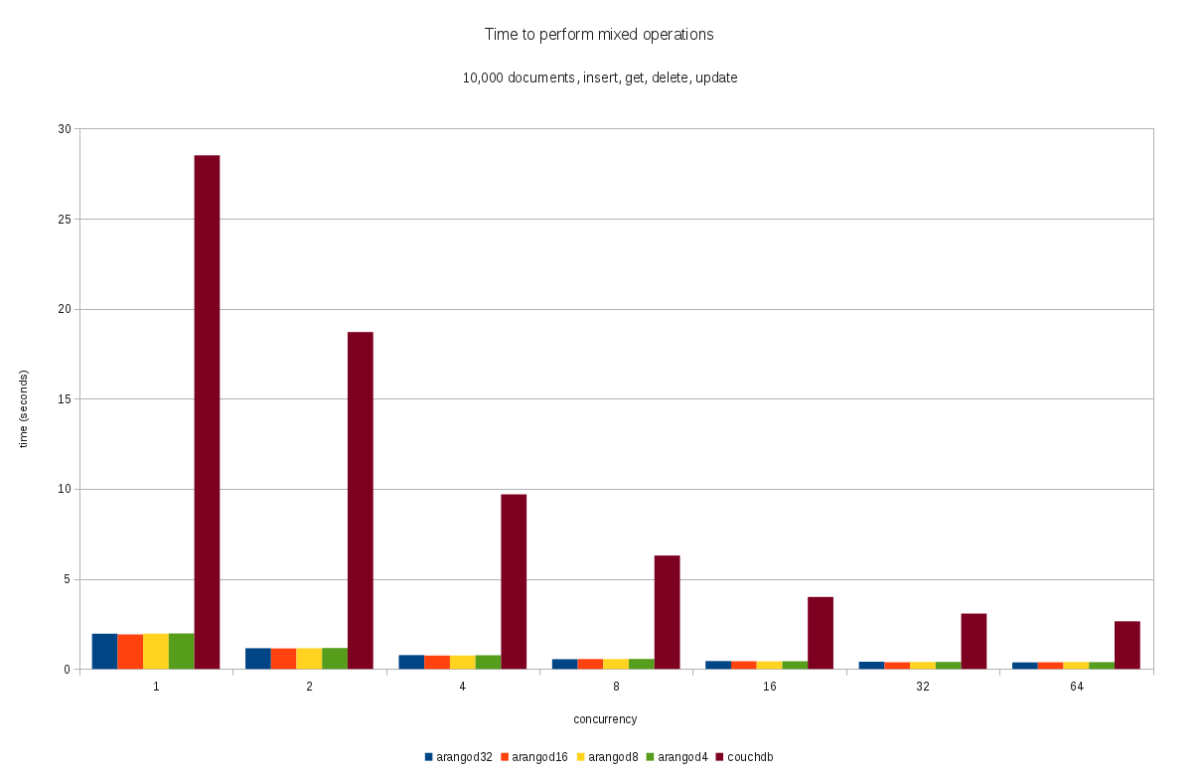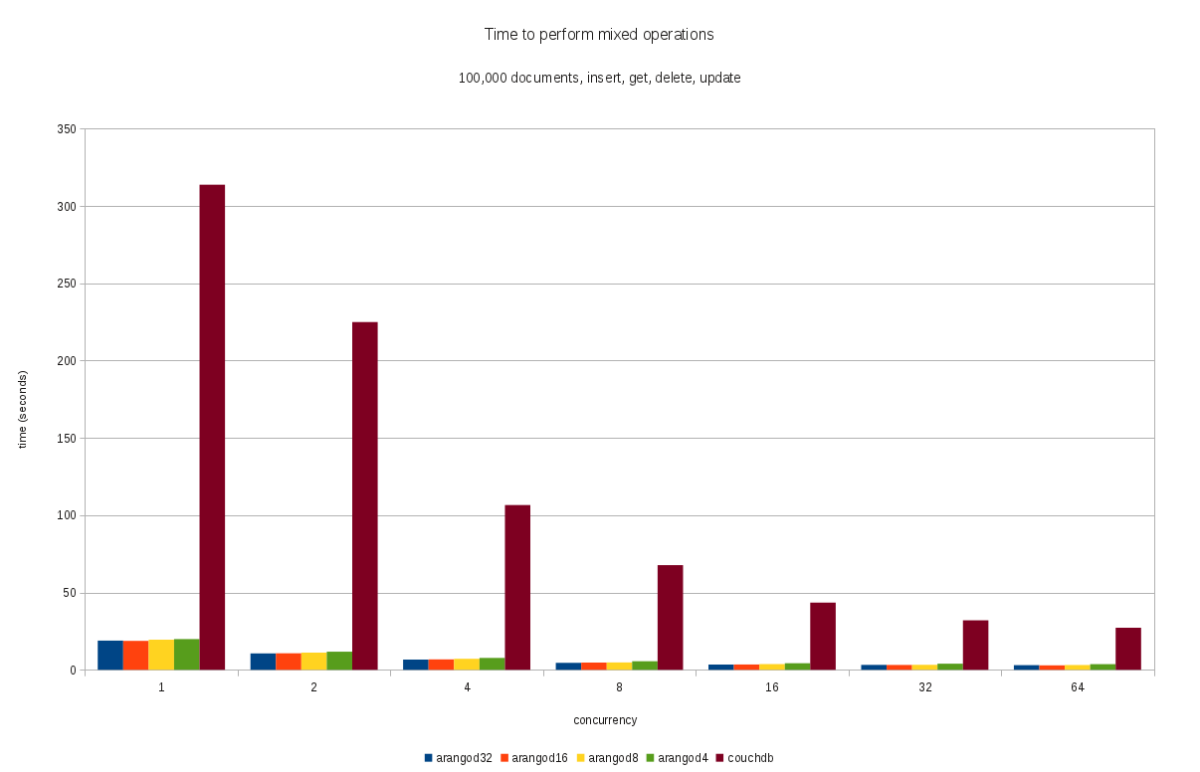ArangoDB 1.01 Released: What’s New? | ArangoDB 2012
This version is deprecated. Download the new version of ArangoDB
Quick note: ArangoDB 1.01 is available. This is a bugfix release. Check the “ArangoDB Google group” for the changelog . By the way – a lot of interesting discussions on ArangoDB, its feature roadmap and how it works in detail, are taking place there. Binaries are always available in the download section.
ArangoDB 2012: Performance Across Different Journal Sizes
As promised in one of the previous posts, here are some performance results that show the effect of different journal sizes for insert, update, delete, and get operations in ArangoDB. (more…)
Get 20% Off: NoSQL Matters Barcelona | ArangoDB 2012
We are on the road again and are invited to give a talk at the “nosql matters” in Barcelona. This is a one day conference in an amazing looking venue (UNESCO world heritage).
Now the conference team offered us a couple of promo codes for “nosql matters” on October, 6th. Katja, one of the organizers, writes:
“there might be some friends, colleagues, contacts or even your followers on twitter who are interested in hearing your talk at NoSQL matters Barcelona. Therefore we would like to give them the opportunity to buy price reduced tickets. With the promotion code BCNSchoenert_7959 you can give 5 of them the chance to buy a ticket with 20% discount.”
So, here we are. Grap the code and get your ticket. We are looking forward to meeting you in Spain.
Bulk Inserts Comparison: MongoDB, CouchDB, ArangoDB ’12
In the last couple of posts, we have been looking at ArangoDB’s insert performance when using individual document insert, delete, and update operations. This time we’ll be looking at batched inserts. To have some reference, we’ll compare the results of ArangoDB to what can be achieved with CouchDB and MongoDB.
(more…)
Bulk Insert Benchmark Tool | ArangoDB 2012
To easily conduct bulk insert benchmarks with different NoSQL databases, we wrapped a small benchmark tool in PHP. The tool can be used to measure the time it takes to bulk upload data into MongoDB, CouchDB, and ArangoDB using the databases’ bulk documents APIs.
(more…)
ArangoDB 2012: Additional Results for Mixed Workload
In a comment to the last post, there was a request to conduct some benchmarks with a mixed workload that does not test insert/delete/update/get operations in isolation but when they work together.
To do this, I put together a quick benchmark that inserts 10,000 documents, and after each insert either
- directly fetches the inserted document (i.e. insert / get),
- updates the inserted documents and retrieves it (i.e. insert / update / get), or
- deletes it (i.e. insert / delete)
The three cases are alternated deterministically, meaning each case occurs with the same frequency and in the same order. It’s probably still not the best ever test case, but at least it reflects a mixed read and write workload.
The document ids used in the test were monotically increasing integers, starting from some base value. That means no random values were used.
The test was repeated for 100,000 documents as well. The dataset still fully fits in RAM. The tests were run in the same environment as the previous tests so one can compare them.
The results are in line with the results shown in the previous post. Here’s the chart with the results of the 10,000 documents benchmark:

And here are the tests result for the 100,000 documents benchmark:

Data Modeling in a Schema-Free Environment | ArangoDB 2012
 We just came back from FroSCon, a large, international open source conference near Bonn, Germany. Jan Steemann, one of the core developers of ArangoDB, had a talk on modelling data in a schema-free world. Jan was given the largest room in the conference for this talk, fortunately a lot of people showed up and even stayed ;-).
We just came back from FroSCon, a large, international open source conference near Bonn, Germany. Jan Steemann, one of the core developers of ArangoDB, had a talk on modelling data in a schema-free world. Jan was given the largest room in the conference for this talk, fortunately a lot of people showed up and even stayed ;-).
You can find Jan’s presentation below.
ArangoDB vs. CouchDB Benchmarking | ArangoDB 2012
A side-effect of measuring the impact of different journal sizes was that we generated some performance test results for CouchDB, too. They weren’t included in the previous post because it was about journal sizes in ArangoDB, but now we think it’s time to share them.
(more…)
ArangoDB 2012: Exploring Additional Datafile Sizes
A while ago we wrote some blog article that explained how ArangoDB uses disk space. That article compared the disk usage of ArangoDB, CouchDB, and MongoDB for loading some particular datasets. In this post, we’ll show in more detail the disk usage of ArangoDB for insert, update, and delete operations. We’ll also compare it to CouchDB for reference.
(more…)
ArangoDB for Node.js Integration | ArangoDB 2012
ArangoDB 3.12 – Performance for all Your Data Models
Estimated reading time: 6 minutes
We are proud to announce the GA release of ArangoDB 3.12!
Congrats to the team and community for the latest ArangoDB release 3.12! ArangoDB 3.12 is focused on greatly improving performance and observability both for the core database and our search offering. In this blog post, we will go through some of the most important changes to ArangoDB and give you an idea of how this can be utilized in your products.
(more…)Advanced Fraud Detection in Financial Services with ArangoDB and AQL
Estimated reading time: 3 minutes
Advanced Fraud Detection: ArangoDB’s AQL vs. Traditional RDBMS
In the realm of financial services, where fraud detection is both critical and complex, the choice of database and query language can impact the efficiency and effectiveness of fraud detection systems. Let’s explore how ArangoDB – a multi-model graph database – is powered by AQL (ArangoDB Query Language) to handle multiple, real-world fraud detection scenarios in a much more seamless and powerful way compared to traditional Relational Database Management Systems (RDBMS).
(more…)Update: Evolving ArangoDB’s Licensing Model for a Sustainable Future
Estimated reading time: 7 minutes
Update: https://arangodb.com/2023/10/evolving-arangodbs-licensing-model-for-a-sustainable- future/
Last October the first iteration of this blog post explained an update to ArangoDB’s 10-year-old license model. Thank you for providing feedback and suggestions. As mentioned, we will always remain committed to our community and hence today, we are happy to announce yet another update that integrates your feedback.
(more…)The world is a graph: How Fix reimagines cloud security using a graph in ArangoDB
‘Guest Blog’
Estimated reading time: 5 minutes
In 2015, John Lambers, a Corporate Vice President and Security Fellow at Microsoft wrote “Defenders think in lists. Attackers think in graphs. As long as this is true, attackers win.ˮ
(more…)Reintroducing the ArangoDB-RDF Adapter
Estimated reading time: 1 minute
ArangoRDF allows you to export Graphs from ArangoDB into RDFLib, the standard library for working with Resource Description Framework (RDF) in Python, and vice-versa.
(more…)Introducing ArangoDB’s Data Loader : Revolutionizing Your Data Migration Experience
Estimated reading time: 7 minutes
At ArangoDB, our commitment to empowering companies, developers, and data enthusiasts with cutting edge tools and resources remains unwavering. Today, we’re thrilled to unveil our latest innovation, the Data Loader, a game-changing feature designed to simplify and streamline the migration of relational databases to ArangoGraph. Let’s dive into what makes Data Loader a must-have tool for your data migration needs.
(more…)How ArangGraphML Leverages Intel’s PyG Optimizations
Estimated reading time: 3 minutes
ArangoGraphML + Intel: Next-level Machine Learning Accelerated
ArangoDB and Intel have announced a groundbreaking partnership to enhance Graph Machine Learning (GraphML) using Intel’s high-performance processors. This collaboration, part of the Intel Disruptor Program, will seek to integrate ArangoDB’s graph database solutions with Intel’s Xeon CPU. This synergy promises to revolutionize data analytics and pattern recognition in complex graph structures, marking a new era in database technology and GraphML advancements.
(more…)ArangoDB’s Exciting Updates: Introducing Our Developer Hub and GenAI Bots!
Estimated reading time: 3 minutes
At ArangoDB, our commitment to empowering developers and data enthusiasts with cutting-edge tools and resources is unwavering. In line with our commitment to “Graph Done Simple,” we are thrilled to unveil two groundbreaking additions to our arsenal that promise to revolutionize your experience with our multi-model graph database.
Developer Hub: Where Knowledge Meets Accessibility
We’ve always believed in the power of community-driven knowledge sharing, and we are proud to present our brand-new Developer Hub, accessible at developer.arangodb.com. This hub is a testament to our dedication to creating an ecosystem that empowers you with the knowledge and resources you need.
(more…)Evolving ArangoDB’s Licensing Model for a Sustainable Future
Estimated reading time: 3 minutes
ArangoDB as a company is firmly grounded in Open Source. The first commit was made in October 2011, and today, we are very proud of having over 13,000 stargazers on GitHub. We believe that the ArangoDB community should be able to enjoy all of the benefits of using ArangoDB, and we have always offered a completely free community edition in addition to our paid enterprise offering.
With the evolving landscape of database technologies and the imperative need to ensure ArangoDB remains sustainable, innovative, and competitive, we’re introducing some changes to our licensing model. These alterations will help us continue our commitment to the community, fuel further development, and assist businesses in obtaining the best from our platform.
These alterations are based on changes in the broader database market.
ArangoGraph Now Available on AWS Marketplace
Estimated reading time: 1 minute
Today we are excited to announce that ArangoGraph, the ArangoDB Managed Service, is available for purchase in the AWS Marketplace. With this announcement, ArangoGraph can now be purchased directly via both AWS and GCP.
The AWS Marketplace provides an extensive catalog of software solutions for users to easily explore, test, buy, and deploy on AWS. If you’re an AWS customer, here’s what this announcement means for you:
(more…)Get the latest tutorials, blog posts and news:
Get the latest tutorials, blog posts and news:
